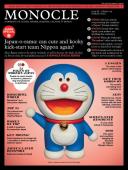
Issue 81
Japan-o-rama: can cute and kooky kick-start team Nippon again? Does Japan want to be taken seriously or will it become the Italy of Asia (a bit too slow for real global success)? A Monocle Special Report
In This Issue
Oops! No content was found.
Looks like we no longer have content for the page you're on. Perhaps try a search?
Return Home

